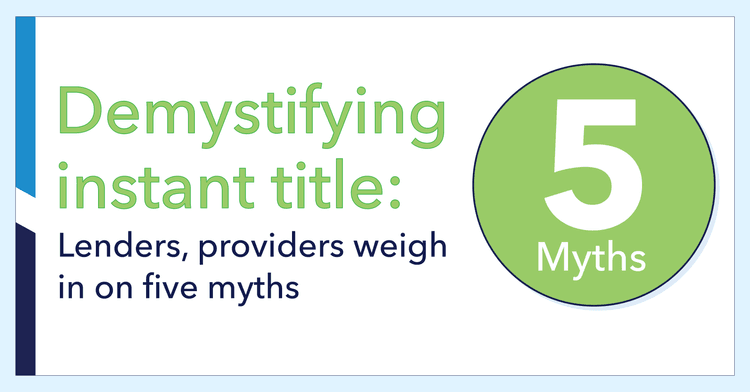Originally published on Forbes.com
It’s been a wild ride for anyone involved in the real estate industry, whether directly or tangentially, over these past couple of years. Homebuyers were forced to put their money where their mouth is to secure a property, while lenders scrambled to keep up with the loan applications that populated their pipelines. Demand was up and inventory was down. It was a unique time in history.
However, the homebuying frenzy is showing signs of slowing. Monthly mortgage applications aren’t as strong as they were, due in part to rising interest rates and soaring home prices. Some studies, including one commissioned by ServiceLink, found that many buyers have bailed on a home search in 2022 after being priced out of the market. But for single-family rental (SFR) investors, opportunities still abound thanks to one particular technology that grew in prominence during the pandemic. It's this technology that has the potential to facilitate the growth of investor portfolios.
The Rise Of RON
The onset of Covid-19 spurred a massive shift toward all things digital, and this includes the housing and financial services industry. Back-end processes that were far down on lenders’ digital road maps suddenly got pushed to the top of the list. There was a simultaneous movement toward digital acceleration to eliminate the need for in-person contact. This resulted in the advancement of things like real estate and lender websites, apps and other e-closing technologies, including remote online notarization (RON).
In a nutshell, RON is really a simple process and one that feels familiar to many in a post-pandemic world. During a RON closing, both a notary and the borrower join a video call via a remote platform. During the call, the borrower’s identity is verified and then the documents are electronically signed by the borrower and fully notarized by the notary.
This virtual option eliminates the need for the parties to physically gather for the closing—something that was of great importance to borrowers and lenders alike during the height of the pandemic. RON was technically available (in select states) before the onset of Covid-19, but it wasn't widely adopted. However, its popularity has since exploded, as evidenced by survey results that found usage spiked 547% from 2019 to 2020 alone.
A Signing Solution
An independent study found that RON technology has been proven to simplify the signing process, improve efficiency and reduce paperwork while taking stringent measures to ensure accuracy and transactional security. The study also found that e-closing, as it’s called, led to a 31% reduction in errors.
For real estate investors, time is money and convenience is key. RON capabilities allow investors to close on a property from their home, office or while they’re out on the road. As we all know, competition for properties has been fierce over the past two and a half years due to the foreclosure moratorium and overall low housing volume. However, for those properties that were scooped up by investors, this technology can extend their geographic footprint (or entrance into new markets) without having to travel for the signing.
With emerging SFR markets in Florida, Texas, Maryland and Pennsylvania, even smaller investors have the opportunity to increase their portfolios. Freddie Mac estimates that "very small" and "small" investors, who own anywhere from one to 50 properties, make up a combined 95% of the estimated market share and own 20.9 million properties across the U.S. Interestingly, institutional investors, described as those who own over 2,000 properties, only make up 1% of the market share. You may think that only the big players in this space would benefit from RON due to the breadth of their investments, but this technology serves the smaller investor in the same way and provides opportunities for them to expand to other markets.
Closing The Loop On A Digital Journey
RON technology is just one more step toward a fully digital homebuying journey. Many aspects of the process have gone digital, from robust real estate apps, virtual tours and virtual inspections to machine learning, artificial-intelligence-assisted underwriting processes and now e-closing solutions like RON. Manual and in-person processes have been replaced with technology that helps increase efficiency and improve the borrowers’ overall experience.
RON Opposition And Opportunities
Although RON provides opportunities that are particularly beneficial to the on-the-go buyer or investor, one thing to keep in mind is that this technology isn't fully approved in every state. Although supporters of the technology claim RON signings help reduce errors, some notary organizations oppose this technology on the basis of data privacy and fraud protection. Others contend that it hurts borrowers who don’t have access to a computer and, therefore, are at a disadvantage.
In states where RON isn't approved, or for lenders that haven’t adopted this technology, hybrid closings have grown in popularity. In a hybrid closing, the borrower receives the closing package ahead of time and electronically signs part of it before the closing. The final steps can then take place via remote online notarization or an in-person closing, cutting down on the amount of time spent during the actual signing meeting.
So, as we collectively navigate whatever is ahead in the housing market, I expect e-closing technology to appeal to more investors, particularly the younger entrants into the SFR space. Gen-Z and millennials are generally more familiar with online tools and tend to gravitate toward a fully digital experience. And although RON may have risen in popularity as a solution during the pandemic, I expect it to be a relevant and reliant technology now and into the future.


